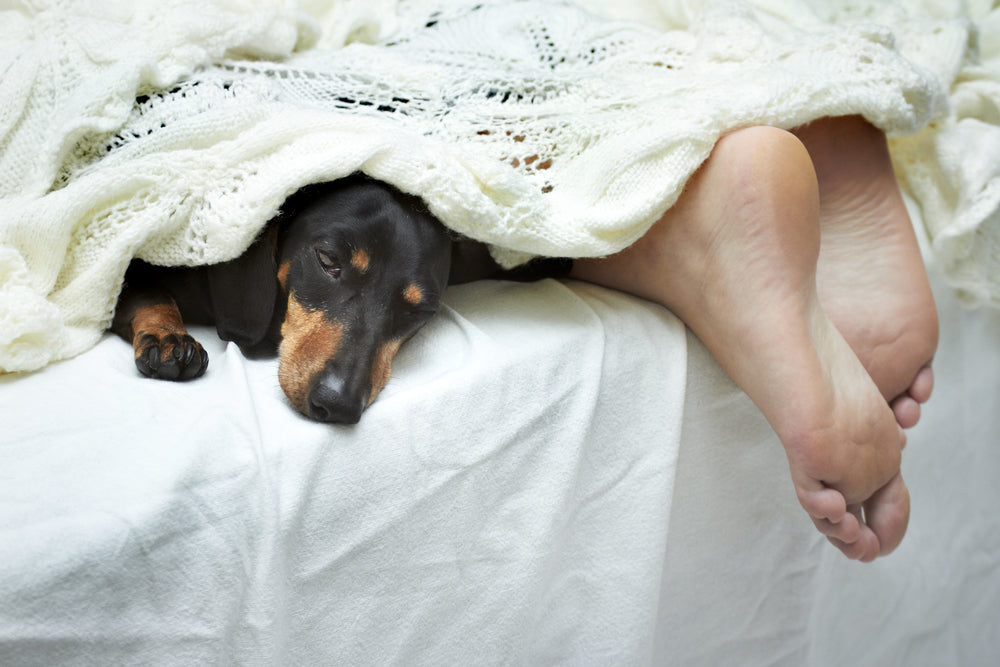Free U.S. Shipping On Orders Over $150

5 Reasons Why You Probably Shouldn't Let Your Dog Sleep On Your Bed
Posted on
Look, I’m all for cuddling up with your pet. It’s good for everyone, human or pet. But letting your dog on your bed can do more harm than good. For most people, it’s fine. But for some sleepers, it’s better to get your dog their own bed.
Here are 5 reasons why it may not be a good idea to co-sleep with your dog (plus some tips if you have to).
5 Problems With Letting Your Dog Sleep On Your Bed
1. Dogs Can Worsen Allergies or Asthma
If you have allergies or asthma, you probably shouldn’t even think about sharing your bed with your dog. Even if you wash and groom your pets often, they can still cause allergy symptoms.
The biggest issue is pet dander, flakes of dead skin that dogs and other animals shed. It’s the equivalent of dandruff. People with pet allergies can experience mild to severe symptoms when around dogs. And it doesn't matter what kind of dog it is or whether it has long or short hair. Any dog can trigger pet allergies.
The other issue is that dogs can worsen a dust mite infestation on your bed. While dust mites typically don't live on a dog’s fur, the dead skin cells your dog sheds on your bed attracts dust mites (dust mites feed on human and animal dead skin cells).
Many people with allergies are sensitive to dust mite allergens. Dust mites can also aggravate asthma. You can learn more about dust mites in your bed in this post we wrote recently.
If your dog spends a lot of time outdoors, they can also carry other allergens like pollen and mold spores in the fur and transfer them onto your bed.
2. Dogs Can Compromise Bed Hygiene
It’s impossible to keep most dogs squeaky clean, particularly if they spend time outside. They will track dirt into the house and onto your bed.
There is also the shedding issue. If you have a dog that sheds a lot, letting it on your bed means you’ll always be finding pet hair everywhere including your pillow, mattress and duvet. Pet hair also carries dander, which is a health issue for people with allergies.
Your dog might also have parasites like ticks, fleas or mites that they can transfer onto the bed.
If you have a dog that’s not yet potty trained or it’s still undergoing training, they might end up peeing or pooping on your bed.
3. Dogs Can Disrupt Your Sleep
Dogs typically don't sleep through the night. They’ll wake up in the middle of the night, get out of bed and pad around the house before coming back. Other dogs are easily startled awake by noises in the night. There are also those dogs that want to sleep right on top of you.
If you are a light sleeper, your dog could wake you up multiple times during the night. That may not seem like a big deal, but it can have a serious effect on sleep quality. You wake up tired and sleep deprived because you never quite got 8 hours of sleep. It also reduces how much deep sleep you get.
Another common complaint for dog owners who sleep with their pet is how much space they take up. Even a small dog might push you to the far edge of your bed as it looks for space to move about and stretch.
This can cause discomfort and keep you from sleeping well. Back and neck pain are common issues caused by co-sleeping with a pet.
4. It Can Affect Your Sex Life
If you share your bed with a partner, letting your dog on your bed is even more complicated. Not only does it leave less room for everyone, it also intrudes into your adult activities. The sooner you train your dog to sleep in their own bed, the better for your sex life.
5. It Can Make Crate Training Harder
Crate training is essential for puppies. It reduces destructive behavior, makes it easier to supervise your pet and teaches your dog how to self-soothe.
Letting a puppy sleep in your bed each night can interfere with crate training. Experts recommend using nighttime for crate training. So giving your puppy free reign over your bed doesn't exactly teach them how to tolerate confined spaces.
It can also make it harder to teach a dog how to sleep on their own bed. It may not seem like a big deal sharing your bed with a puppy, but as they grow bigger and take up more space, you will wish you had trained them to sleep on their own.
Tips for Co-Sleeping With Your Dog
If you have to co-sleep with your dog (maybe it helps with your anxiety or your dog sleeps better that way), here are some tips to protect your health and sleep.
- Definitely use a waterproof mattress protector just in case of any accidents. A mattress protector also keeps dirt, allergens, parasites and stains from getting onto your mattress where they are difficult to remove.
- Consider getting a pet pad or blanket where they can sleep on instead of sleeping directly on your bedding. This can protect your delicate linen from tears and stains.
- Groom your dog regularly to reduce how much dirt and allergens they introduce onto the bed.
- Instead of sleeping on the same bed with your dog, consider getting them their own bed next to your bed. This can be a good compromise for pets with anxiety.
- Clean your bedding frequently.
Quick links
Contact
6063 Hudson Road #160
Woodbury, MN 55125
Yo@hercLeon.com
Leave a comment: